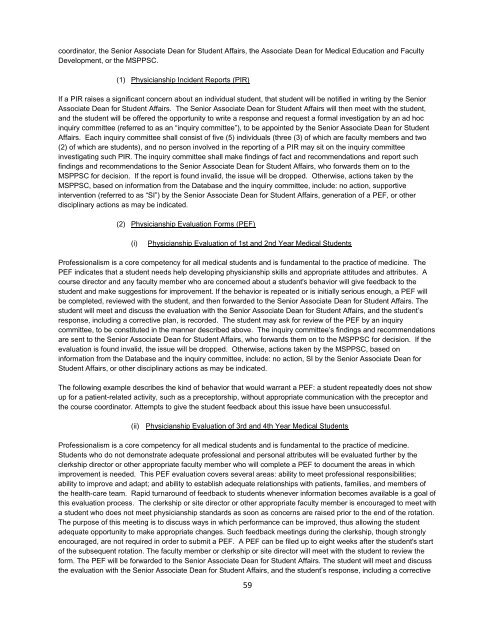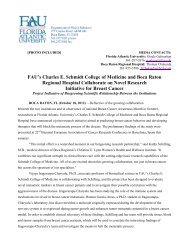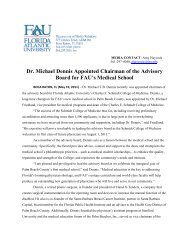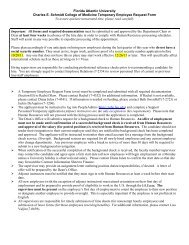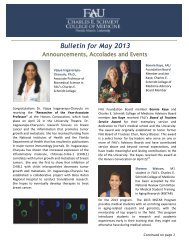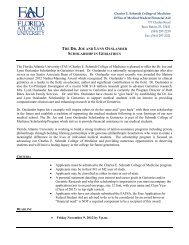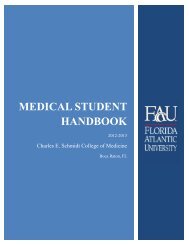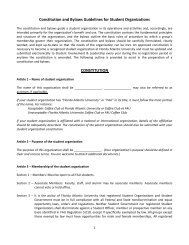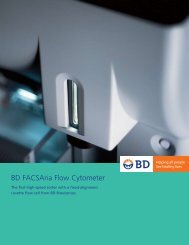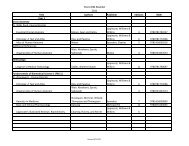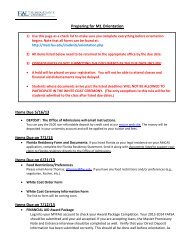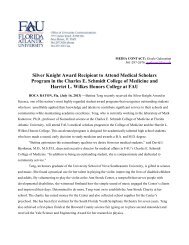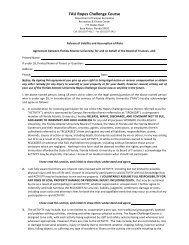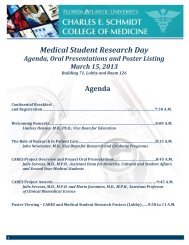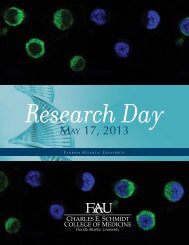Student Handbook - College of Medicine - Florida Atlantic University
Student Handbook - College of Medicine - Florida Atlantic University
Student Handbook - College of Medicine - Florida Atlantic University
You also want an ePaper? Increase the reach of your titles
YUMPU automatically turns print PDFs into web optimized ePapers that Google loves.
coordinator, the Senior Associate Dean for <strong>Student</strong> Affairs, the Associate Dean for Medical Education and FacultyDevelopment, or the MSPPSC.(1) Physicianship Incident Reports (PIR)If a PIR raises a significant concern about an individual student, that student will be notified in writing by the SeniorAssociate Dean for <strong>Student</strong> Affairs. The Senior Associate Dean for <strong>Student</strong> Affairs will then meet with the student,and the student will be <strong>of</strong>fered the opportunity to write a response and request a formal investigation by an ad hocinquiry committee (referred to as an “inquiry committee”), to be appointed by the Senior Associate Dean for <strong>Student</strong>Affairs. Each inquiry committee shall consist <strong>of</strong> five (5) individuals (three (3) <strong>of</strong> which are faculty members and two(2) <strong>of</strong> which are students), and no person involved in the reporting <strong>of</strong> a PIR may sit on the inquiry committeeinvestigating such PIR. The inquiry committee shall make findings <strong>of</strong> fact and recommendations and report suchfindings and recommendations to the Senior Associate Dean for <strong>Student</strong> Affairs, who forwards them on to theMSPPSC for decision. If the report is found invalid, the issue will be dropped. Otherwise, actions taken by theMSPPSC, based on information from the Database and the inquiry committee, include: no action, supportiveintervention (referred to as “SI”) by the Senior Associate Dean for <strong>Student</strong> Affairs, generation <strong>of</strong> a PEF, or otherdisciplinary actions as may be indicated.(2) Physicianship Evaluation Forms (PEF)(i)Physicianship Evaluation <strong>of</strong> 1st and 2nd Year Medical <strong>Student</strong>sPr<strong>of</strong>essionalism is a core competency for all medical students and is fundamental to the practice <strong>of</strong> medicine. ThePEF indicates that a student needs help developing physicianship skills and appropriate attitudes and attributes. Acourse director and any faculty member who are concerned about a student's behavior will give feedback to thestudent and make suggestions for improvement. If the behavior is repeated or is initially serious enough, a PEF willbe completed, reviewed with the student, and then forwarded to the Senior Associate Dean for <strong>Student</strong> Affairs. Thestudent will meet and discuss the evaluation with the Senior Associate Dean for <strong>Student</strong> Affairs, and the student’sresponse, including a corrective plan, is recorded. The student may ask for review <strong>of</strong> the PEF by an inquirycommittee, to be constituted in the manner described above. The inquiry committee’s findings and recommendationsare sent to the Senior Associate Dean for <strong>Student</strong> Affairs, who forwards them on to the MSPPSC for decision. If theevaluation is found invalid, the issue will be dropped. Otherwise, actions taken by the MSPPSC, based oninformation from the Database and the inquiry committee, include: no action, SI by the Senior Associate Dean for<strong>Student</strong> Affairs, or other disciplinary actions as may be indicated.The following example describes the kind <strong>of</strong> behavior that would warrant a PEF: a student repeatedly does not showup for a patient-related activity, such as a preceptorship, without appropriate communication with the preceptor andthe course coordinator. Attempts to give the student feedback about this issue have been unsuccessful.(ii) Physicianship Evaluation <strong>of</strong> 3rd and 4th Year Medical <strong>Student</strong>sPr<strong>of</strong>essionalism is a core competency for all medical students and is fundamental to the practice <strong>of</strong> medicine.<strong>Student</strong>s who do not demonstrate adequate pr<strong>of</strong>essional and personal attributes will be evaluated further by theclerkship director or other appropriate faculty member who will complete a PEF to document the areas in whichimprovement is needed. This PEF evaluation covers several areas: ability to meet pr<strong>of</strong>essional responsibilities;ability to improve and adapt; and ability to establish adequate relationships with patients, families, and members <strong>of</strong>the health-care team. Rapid turnaround <strong>of</strong> feedback to students whenever information becomes available is a goal <strong>of</strong>this evaluation process. The clerkship or site director or other appropriate faculty member is encouraged to meet witha student who does not meet physicianship standards as soon as concerns are raised prior to the end <strong>of</strong> the rotation.The purpose <strong>of</strong> this meeting is to discuss ways in which performance can be improved, thus allowing the studentadequate opportunity to make appropriate changes. Such feedback meetings during the clerkship, though stronglyencouraged, are not required in order to submit a PEF. A PEF can be filed up to eight weeks after the student's start<strong>of</strong> the subsequent rotation. The faculty member or clerkship or site director will meet with the student to review theform. The PEF will be forwarded to the Senior Associate Dean for <strong>Student</strong> Affairs. The student will meet and discussthe evaluation with the Senior Associate Dean for <strong>Student</strong> Affairs, and the student’s response, including a corrective59


